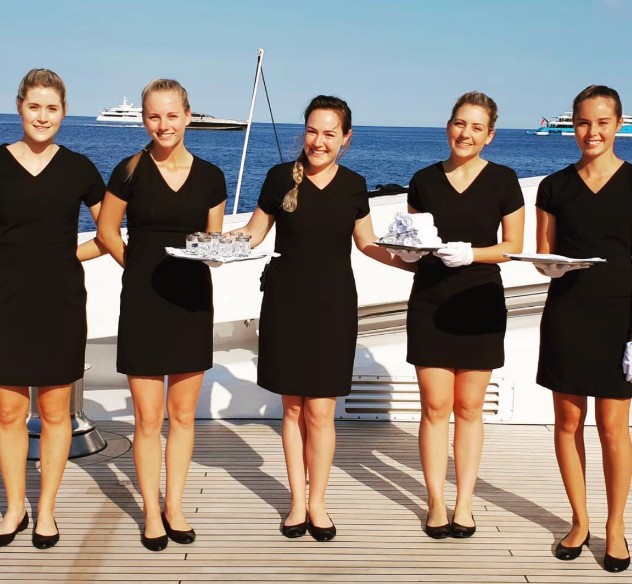It’s the ideal way to combine work and travel, and you’ll get to spend your time outside and in some of the most breathtaking locations on earth.
An Explanation Of A Yacht Stewardess
A steward or stewardess looks after a superyacht’s interior and offers five-star service to its owners and visitors. The interior team provides the highest level of attention to detail when handling beverage and meal service, housekeeping, and laundry on charter or owner trips. They interact with guests the most and are therefore in charge of conveying their requests to the captain, chef, and deck department.
What Is A Yachtie?
Make sure we are all singing from the same hymnal before we continue.
Any person who works on a yacht is referred to as a yachtie. It has come to be used more specifically to refer to people who work as yacht crew on superyachts.
Superyachts are very large, luxurious boats that are frequently owned by multi-millionaires and billionaires.
These superyacht employees, known as Yachties, hold a variety of jobs. The majority of Yachties begin their superyacht careers as Deckhands or Stewardesses. Your role will change as you climb the career ladder as you gain more experience and responsibility.
There are other forms of yachting and Yachties, it should be noted. Those who have earned their Yachtmaster certification and work as charter boat captains could be considered the other type of “Yachtie.”
What Credentials Do I Require To Work On A Superyacht?
To become a Superyacht Stewardess, you must meet requirements in three areas of education and experience. The first two are required; the third is up to you and your prior work history in the hospitality industry.
- All crew who work at sea are required to have an ENG1 medical. We advise taking the ENG1 medical before moving on to Step 2 if you are considering becoming a Superyacht Stewardess.
- All crew who work at sea are required to complete the STCW Basic Safety Training Course. You will finish a course in sea survival, as well as courses in first aid, fire fighting (which is a lot of fun), health and safety, and security.
- Get some experience; it will look great on your resume if you have experience in the hospitality industry or have worked as a nanny, beautician, hairdresser, or air steward/ess, to name a few.
I Don’t Have Any Experience, How Do I Get A Job On A Yacht?
It is true that, aside from the prerequisite education listed above, you do not need experience working on a yacht to begin a career as a stewardess.).
But like any new career, it’s a good idea to receive some training in the fundamentals so you can function on board. One size does not fit all because every yacht operates slightly differently. The more experience you can gain, the better, as it will improve your chances of landing a job.
It is better for the yacht if you have more experience. Therefore, Flying Fish can be useful if you lack any transferable skills.
5 Steps To Becoming A Yachtie
You can now select the position that best suits you since you have a better understanding of the available job roles. Anyone who wants it can become a Yachtie with the proper mindset, credentials, and knowledge of where to look for work.
- Have the right attitude
- Pass an ENG1 medical
- Complete STCW Basic Safety Training
- Gain experience
- Go to a superyacht marina
1. Have The Right Attitude
To become a Yachtie, in addition to obtaining the necessary credentials to demonstrate your proficiency, you must possess a number of qualities that will help you succeed in this field.
Yachties must be well-groomed, articulate, able to follow instructions, and willing to work hard while maintaining a positive attitude. You must be able to put in extraordinarily long hours, occasionally in demanding situations, without losing patience.
Although working on a superyacht may sound glamorous, you might want to reconsider if you’re on your tenth day of work in a row and are trying to clean a toilet with your head stuck down it. You must be okay with spending a lot of time away from home and not seeing your friends and family if you want to become a yachtie. All of this may seem obvious, but not everyone will be happy in this situation, and if you don’t carefully weigh the drawbacks, you’ll leave this field sooner than you entered.
2. Pass Eng1 Medical
Obtaining an ENG1 medical certificate is the first tangible step you must take in order to become a Yachtie. An approved MCA (Maritime and Coastguard Agency) doctor will examine you for the ENG1 medical to make sure you are healthy and capable of working at sea.
An ENG1 medical certificate is a requirement for anyone working at sea; without one, you cannot begin working on superyachts. The examination will last about 45 minutes, during which the doctor will go over a checklist to make sure you don’t have any underlying medical conditions that could endanger your or anyone else’s safety on board the ship.
Color blindness is the most frequent cause of new yacht crew members failing the ENG1. Unexpectedly many people are color blind and go their entire lives without even realizing it. On a ship, though, this could have a significant impact. It will be impossible for you to assist in navigating the ship in an emergency if you are unable to correctly recognize signals and lights. Sadly, this means you won’t be able to begin working as a Yachtie.
3. Complete Stcw Basic Safety Training
Completing the STCW Basic Safety Training is another prerequisite for maritime employment. Similar to the ENG1, only those with the STCW certificate are eligible for employment on yachts.
The acronym STCW stands for Standards of Training, Certification, and Watchkeeping. Its purpose is to guarantee that all seafarers are aware of the necessary procedures and know what to do in an emergency.
The STCW Programs are very entertaining and action-packed. You will dive right in and learn everything there is to know about working on a yacht, from fire fighting to sea survival.
4. Gain Experience
It will suffice to have your ENG1 and STCW certificates if you are fortunate enough to receive a job offer on a superyacht.
It’s completely normal to go through all of these steps without having a job lined up yet, so don’t worry if you haven’t received a job offer just yet. If so, it would be wise to increase your knowledge and credentials in order to stand out from other candidates for the same position.
Enrolling in a Deckhand or Stewardess Course will help you achieve this. In addition to receiving your standard STCW certificate from these courses, you will also receive a list of additional certifications that attest to your professionalism, skill, and dedication to the industry.
The deckhand will learn basic yacht maintenance, how to operate a small yacht, how to maintain engines, and how to properly care for teak. Stewardesses will have a working knowledge of wine, how to serve it, how to arrange flowers, and how to operate a powerboat.

4. Go To A Superyacht Marina
When you have finished your superyacht training, you should head to France to start your job search. Going to one of the major superyacht marinas and handing Captains your resume is a great way to find work in addition to signing up with yacht crew recruitment agencies. The term “dock walking” refers to this.
You will have the option to sign up for our recruitment day in Antibes, France if you complete your Superyacht Course with us. We travel to France as a group, walk you through the procedure, and provide you with our contacts in the business.
All of our students quickly find employment, making this a fantastic way to begin your journey.
Yacht Deckhand
Yacht Deckhands maintain the exterior of the boat, as opposed to the Stewardess position.
Deckhands, who are primarily men, are responsible for performing general maintenance, cleaning the teak deck, caring for the toys (such as jet skis), and even operating the tenders.
Deckhands should have a basic understanding of how a boat works because they may be called upon to assist the Bosun or Captain with navigation, VHF communication, or engine upkeep.
It is common for Deckhands to lend a hand during the hectic evening meal preparation and service. Deckhands may also occasionally assist the Stewardesses.
The Ideal Time To Look For Stewardess Superyacht Work Is When?
Superyachts typically hire between the months of February and May in preparation for the Mediterranean season. Yachts do, however, employ people all year long. When the season is in full swing in July and August, we have witnessed numerous graduates finding employment.
In order for yachts to be ready for the Caribbean season, the following crucial hiring period is between September and November. Anytime between December and January, yachts will cross the Atlantic to spend the winter cruising the US or the Caribbean.
When superyacht crew members decide to take the winter off after a busy Mediterranean season, opportunities for new crew members to enter the industry arise.
What Do Yachties Earn?
You’ve supposedly heard that working on superyachts can earn you a good living. Many people choose to work as Yachties because of the travel opportunities and excellent pay.
Similar to any other job in any industry, your salary will vary depending on your employer, your experience, your responsibilities, and your credentials.
A salary of between €2,000 and €2,500 per month is what you can anticipate as a new Yachtie. Once you gain more experience and credentials, your salary can easily increase to more than €4,000 per month.
When you look at the salary on its face, it appears great but not extraordinary, but when you are at sea, you have no outgoings. When compared to working from home, working on a yacht means you won’t have to pay rent, bills, or food.
Paying Taxes: Do Yachties?
Additionally, the fact that Yachties do not pay income tax makes the salary so alluring. Yachties who qualify for the Seafarers Earning Deduction government program can keep all of their earnings.
You must be employed on a ship out of UK waters for a minimum of 365 days in order to be eligible to apply for the Seafarers Earning Deduction. This does not imply that you must travel for a full year at once, but rather that you must wait until the total number of days you spend working on a yacht equals 365 before applying.
Before you begin working on a superyacht, it will be extremely helpful to be able to understand this tax system.
What Are The Benefits Of Becoming A Yacht Stewardess
The yachting industry is fantastic. Without a college degree, it is possible to travel the world, interact with people from different cultures, make outrageous salaries, and accumulate significant savings.
If you want to travel the world or save money for college, it is a great job to do during a gap year or two. I could never have imagined the opportunities and experiences that sailing has provided for me.
I had the opportunity to travel in a submarine, watch the Monaco Grand Prix, go on Gucci shopping sprees, and so much more. Yachting opens up a whole new world to you.
It’s a job that’s exciting and fun, but it also has a lot of advantages.
Conclusions
Not everyone is qualified for a position as a yacht stewardess. Sociality and comfort with sharing your space are prerequisites. Since you will be sharing a cabin, there will probably always be someone nearby.

